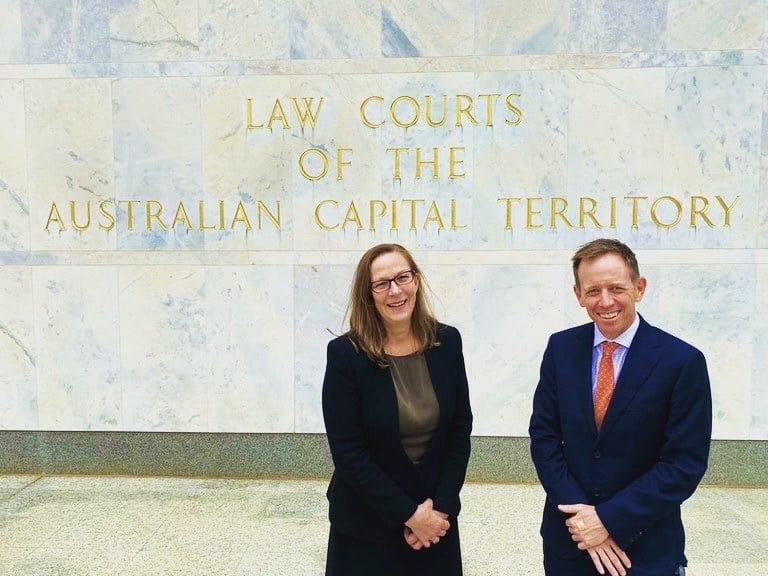Lucy McCallum will become the sixth Chief Justice of the ACT Supreme Court, succeeding Helen Murrell, who will retire early next year. The appointment is a return to Canberra for Justice McCallum, who worked as a public prosecutor in Canberra in the 1980s.
“This Court is an extremely strong court,” Justice McCallum said. “Chief Justice Murrell has left it in a very good state, and that makes it all the more exciting for me to come into that position with the opportunity to listen to what people want to see the court do, the ways in which they want it to move. And I’m ready to take on that role with a lot of energy in March.”
Justice McCallum said she will focus on cementing the ACT’s reputation as a place of excellent jurisdiction.
She is particularly interested in addressing the over-representation of Indigenous people in jail, “a national tragedy”.
“It’s easy to say, but it’s a difficult problem to solve,” she said.
At this stage, she has some ideas, but would need to learn more about the jurisdiction before she could tell whether they would work here.
“One thing is to develop systems that engage respectfully with those communities, but it can’t just come from white people telling blackfellas what to do. We have to engage respectfully, and hopefully get Indigenous Elders on board.”
Overcrowding in prisons is a problem for all Australians, Justice McCallum argued.
“It’s expensive, and it doesn’t necessarily address the problems that take people to prison,” she said.
“I’m keen to look at any policies and proposals that will be directed to rehabilitation rather than endless punitive measures.”
She also wants to hold a commercial case list. “That will give the commercial community an excellent centre of justice, where they can come and have their disputes resolved quickly and with excellent jurisprudence.”
Justice McCallum also wants to clear the backlog of court cases delayed by pandemic restrictions.
“It does trouble me to think of people being on remand for longer than they should be because jury trials weren’t able to be held,” she said. “It’s a question of all people involved in the legal system having to pull together and work harder for a period to clear the backlog.
“I’m certainly ready to hit the deck running, trying to learn what the backlog is here and seeing how we can best address it. We’re in a good position in the ACT because we do have access to some additional judges, which not every court can do, so that hopefully will help to address the problem.”
Justice McCallum was appointed Justice in the Common Law Division of the NSW Supreme Court in 2008, and elevated to the NSW Court of Appeal in January 2019. After graduating from the University of NSW, she began her career as a commercial litigation solicitor in 1986; worked at the Commonwealth Director of Public Prosecutions in Canberra from 1988 to 1990; and was called to the Bar in 1991.
“Her legal career spans more than 30 years, and has cemented her standing in the Australian legal profession,” said ACT Attorney-General Shane Rattenbury.
Justice McCallum believes that the law should serve the underprivileged, according to an online bio. She has practised pro bono for the Redfern Legal Centre, set up law school programs for disadvantaged inner-city schools, and represented refugees in immigration detention, Greenpeace, and the Environmental Defender’s Office. She was also the first judge in Australia to consider whether Twitter constituted a separate publication of defamatory material.
Justice McCallum and her partner will live in a rural setting with their horses, dogs, and caravan of animals. She last worked in Canberra three decades ago, and was surprised how much the city still looked and felt the same.
“There are certainly more restaurants!” she said. “It’s a very friendly town, but the big difference is … you’ve now got a 30-year-old government that’s dynamic, and has some really good ideas. I’m excited about working with the government in the ways that we can to address particularly some of those criminal justice issues.”
Likewise, Mr Rattenbury welcomed her appointment, which he said followed an extensive search that drew a high-calibre field – 17 applicants, six interviewed.
He also thanked Chief Justice Murrell, who was the ACT’s first female Chief Justice.
“All Canberrans owe her a debt of gratitude for her outstanding contributions to the ACT’s system of justice,” he said.
Justice John Burns, a judge of the ACT Supreme Court since 2011, will also retire next year; a new resident judge will be appointed by February.



